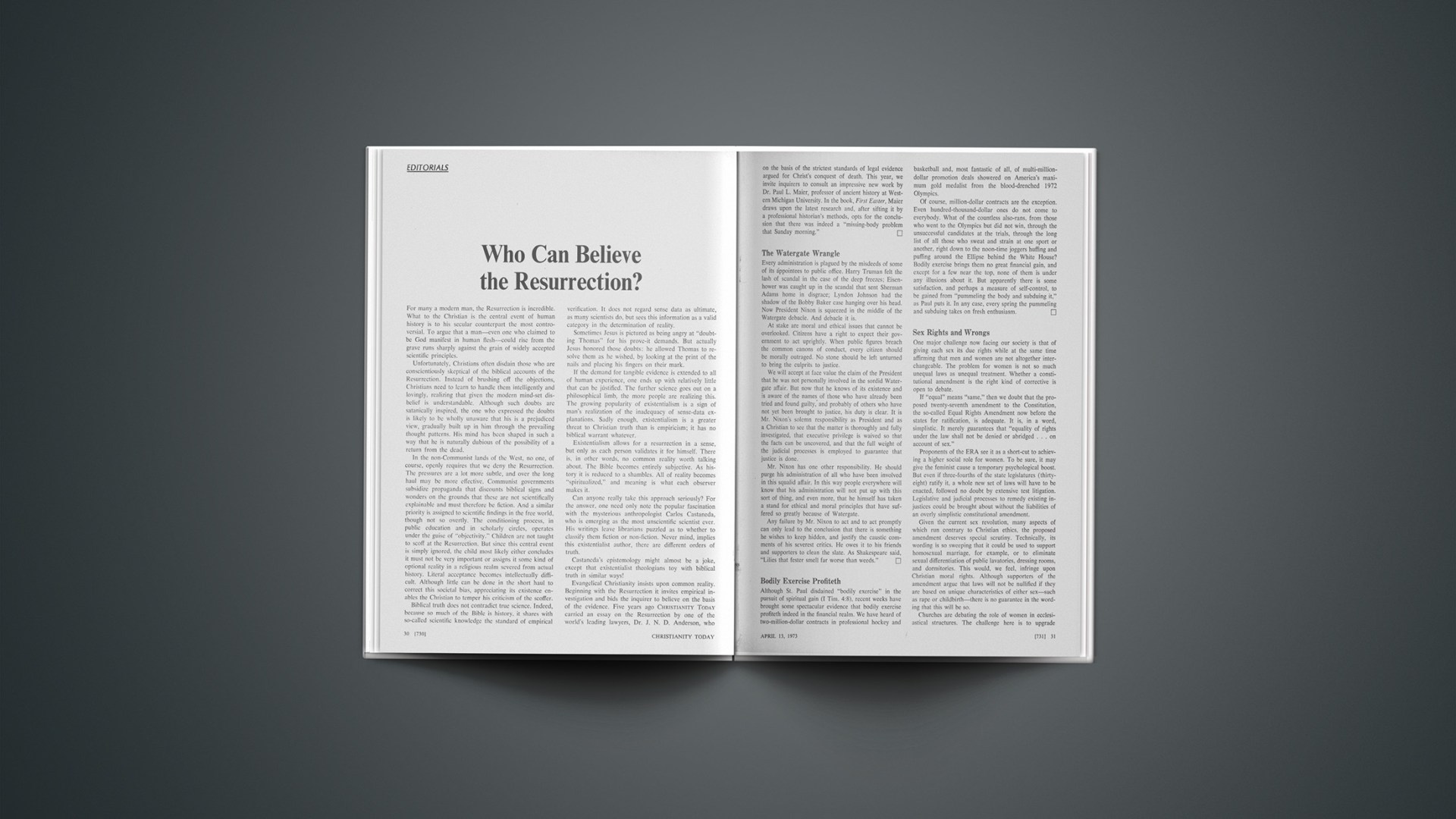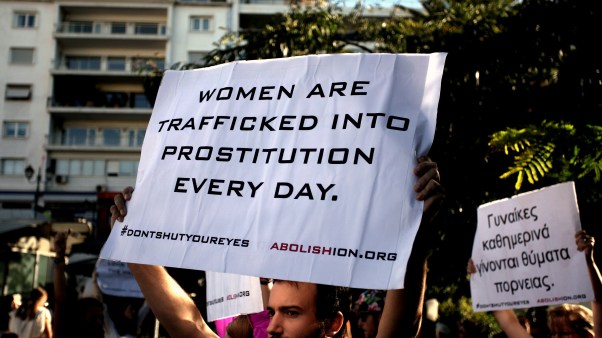The Watergate Wrangle
Every administration is plagued by the misdeeds of some of its appointees to public office. Harry Truman felt the lash of scandal in the case of the deep freezes; Eisenhower was caught up in the scandal that sent Sherman Adams home in disgrace; Lyndon Johnson had the shadow of the Bobby Baker case hanging over his head. Now President Nixon is squeezed in the middle of the Watergate debacle. And debacle it is.
At stake are moral and ethical issues that cannot be overlooked. Citizens have a right to expect their government to act uprightly. When public figures breach the common canons of conduct, every citizen should be morally outraged. No stone should be left unturned to bring the culprits to justice.
We will accept at face value the claim of the President that he was not personally involved in the sordid Watergate affair. But now that he knows of its existence and is aware of the names of those who have already been tried and found guilty, and probably of others who have not yet been brought to justice, his duty is clear. It is Mr. Nixon’s solemn responsibility as President and as a Christian to see that the matter is thoroughly and fully investigated, that executive privilege is waived so that the facts can be uncovered, and that the full weight of the judicial processes is employed to guarantee that justice is done.
Mr. Nixon has one other responsibility. He should purge his administration of all who have been involved in this squalid affair. In this way people everywhere will know that his administration will not put up with this sort of thing, and even more, that he himself has taken a stand for ethical and moral principles that have suffered so greatly because of Watergate.
Any failure by Mr. Nixon to act and to act promptly can only lead to the conclusion that there is something he wishes to keep hidden, and justify the caustic comments of his severest critics. He owes it to his friends and supporters to clean the slate. As Shakespeare said, “Lilies that fester smell far worse than weeds.”
Bodily Exercise Profiteth
Although St. Paul disdained “bodily exercise” in the pursuit of spiritual gain (1 Tim. 4:8), recent weeks have brought some spectacular evidence that bodily exercise profiteth indeed in the financial realm. We have heard of two-million-dollar contracts in professional hockey and basketball and, most fantastic of all, of multi-million-dollar promotion deals showered on America’s maximum gold medalist from the blood-drenched 1972 Olympics.
Of course, million-dollar contracts are the exception. Even hundred-thousand-dollar ones do not come to everybody. What of the countless also-rans, from those who went to the Olympics but did not win, through the unsuccessful candidates at the trials, through the long list of all those who sweat and strain at one sport or another, right down to the noon-time joggers huffing and puffing around the Ellipse behind the White House? Bodily exercise brings them no great financial gain, and except for a few near the top, none of them is under any illusions about it. But apparently there is some satisfaction, and perhaps a measure of self-control, to be gained from “pummeling the body and subduing it,” as Paul puts it. In any case, every spring the pummeling and subduing takes on fresh enthusiasm.
Sex Rights And Wrongs
One major challenge now facing our society is that of giving each sex its due rights while at the same time affirming that men and women are not altogether interchangeable. The problem for women is not so much unequal laws as unequal treatment. Whether a constitutional amendment is the right kind of corrective is open to debate.
If “equal” means “same,” then we doubt that the proposed twenty-seventh amendment to the Constitution, the so-called Equal Rights Amendment now before the states for ratification, is adequate. It is, in a word, simplistic. It merely guarantees that “equality of rights under the law shall not be denied or abridged … on account of sex.”
Proponents of the ERA see it as a short-cut to achieving a higher social role for women. To be sure, it may give the feminist cause a temporary psychological boost. But even if three-fourths of the state legislatures (thirty-eight) ratify it, a whole new set of laws will have to be enacted, followed no doubt by extensive test litigation. Legislative and judicial processes to remedy existing injustices could be brought about without the liabilities of an overly simplistic constitutional amendment.
Given the current sex revolution, many aspects of which run contrary to Christian ethics, the proposed amendment deserves special scrutiny. Technically, its wording is so sweeping that it could be used to support homosexual marriage, for example, or to eliminate sexual differentiation of public lavatories, dressing rooms, and dormitories. This would, we feel, infringe upon Christian moral rights. Although supporters of the amendment argue that laws will not be nullified if they are based on unique characteristics of either sex—such as rape or childbirth—there is no guarantee in the wording that this will be so.
Churches are debating the role of women in ecclesiastical structures. The challenge here is to upgrade women’s roles consonant with scriptural principles (women have undeniably been discriminated against in the churches; see the editorial, “First at the Cradle, Last at the Cross,” March 16 issue, page 26). But if the ERA passes, the churches’ decisions will be made for them. Women might have the right to claim any position, biblical principles and church policies notwithstanding. This could open the door wide to nullification of the constitutional guarantee of freedom of religion (which would include the right of churches to deny ordination to women) and bring the government and the courts to a place where the historic doctrine of separation of church and state would no longer inhere. A seminary, for example, could be denied recognition for the GI bill unless it recruited women. A denomination could be denied any military chaplains unless it sponsored otherwise qualified women.
THE PROPOSED EQUAL RIGHTS AMENDMENT TO THE UNITED STATES CONSTITUTION
Section 1. Equality of rights under the law shall not be denied or abridged by the United States or by any State on account of sex.
Section 2. The Congress shall have the power to enforce, by appropriate legislation, the provisions of this article.
Section 3. This amendment shall take effect two years after the date of ratification.
The Apostle Peter’s admonition to husbands applies remarkably well in the contemporary scene. He told them to honor their wives because they are the weaker sex, and also, interestingly enough, because they are “heirs just as much as you to the gracious gift of life” (1 Pet. 3:7, New American Bible). You may want to read “weaker” as “different” in the secular context, but the principle will still remain. It affords women all they deserve as human beings, while at the same time recognizing distinction between the sexes.
Men are now subject to certain restrictions because they are men, and women because they are women. In the best interests of both, let’s keep it that way.
Christians And Political Bias
The increasing politicizing of the National and the World Council of Church was underscored again last month in their sponsoring a tour of the United States by thirteen third-world “churchmen.” The group represents an intensely partisan, anti-institutional viewpoint, and their thinking has had, in the words of an NCC spokesman, “a considerable impact upon Christian theology in their own countries and thus upon the World Council.” All are advocates of a “theology of liberation.”
What should continue to amaze the WCC-NCC constituency is that “liberation” is applied so selectively. Has either council ever offered any material support for Christians whose religious freedoms are curtailed in the Soviet Union, in consideration of the fact that a number of these belong to member churches of the World Council?
And was any word of concern expressed last month when the government of Afghanistan seized the only Christian church in the country, deported the pastor, and threatened to demolish the building (see March 30 issue, page 5l)?
Calling Some Men Somewhere
Discomfited by the increasing number of Jews who are accepting Jesus, and exasperated by what may look like a massive blitz to make America Christian, many Jews have reacted with indignation and dismay to Key 73 and its aim, “Calling our continent to Christ.” This reaction has produced a corresponding anxiety among Christians, including many of those participating in Key 73, who fear that the whole task of proclaiming Christ to the unconverted is in danger of getting bogged down in interfaith controversy.
In view of this, evangelist Billy Graham sought to clarify the purpose of Key 73: “to call all men to Christ without singling out any specific religious or ethnic group” (see March 16 issue, page 29). This is quite consistent with the statement made by Paul the Jew to the Gentile Athenians: “The times of ignorance God overlooked, but now he commands all men everywhere to repent” (Acts 17:30). Nominal Jews and adherents of other religions should not be singled out for evangelistic attention any more than nominal Christians should be exempted from it.
At the same time, certain nominally Christian groups, including, apparently, the Key 73 Task Force of the Southern California-Arizona Conference of the United Methodist Church, have rewritten the project’s mandate to apply only to “those of our Continent who are not actively related to any of the religious organizations in our society.” In a February 6 press release this task force tells us, “Any assumption that those of other religious traditions are without a meaningful faith is arrogant and presumptuous.”
It would seem neither arrogant nor presumptuous but simply a matter of drawing attention to the obvious to state that many adherents of all religious traditions in America “are without a meaningful faith.” Indeed, as these Methodists suggest—and their letter makes it more evident than perhaps they realize—“there are plenty of prospects for conversion” among those who are officially Christian. But are we to limit the call to Christ to those who are of some Christian tradition but whose faith is not “meaningful”—in other words, to those who have already been called but have not answered?
Believing Christians know that denominational or national ties with Christianity are meaningless as an indication of individual spiritual life. How ridiculous to suggest that traditional or ethnic ties with some other great religious tradition make a confrontation with the Gospel of Jesus Christ superfluous. On this level alone, the promise to abstain from appealing to those “of other religious traditions” is an absurdity.
But even where the adherent of a non-Christian religion is committed to his tradition and finds his faith subjectively meaningful, the Christian is still required to proclaim Christ to him. As Paul himself said, we are “under obligation both to Greeks and to barbarians, both to the wise and to the foolish … to the Jew first, and also to the Greek” (Rom. 1:14, 16).
To respect others’ rights to choose for themselves and come to different conclusions from ours is one thing. To suggest that we have no duty or no right to proclaim Christ to all people, but are to confine the call to “selected” nominal Christians, is quite another. It represents a complete misunderstanding of the nature of the Gospel, which is “the power of God unto salvation, to the Jew first, and also to the Greek.”
Apartheid Takes A Back Seat
South Africa underwent a new experience last month. Billy Graham made his first preaching appearance there, and the South Africans met the condition he has laid down for preaching in any country: that the people who come to hear him be seated as they please, whatever their racial background. The crowd of 45,000 that assembled at King’s Park Rugby Stadium in Durban was about half white and half non-white (news media had reported that day Graham’s announced opposition to the government’s apartheid policy).
Billy Graham has never participated in racial demonstrations, and some have criticized him for his reticence at this point. Unfortunately, many do not know that he has insisted on non-segregated audiences, and that in some of his meetings in the American South he, in an unheralded way, pioneered in this respect. Quietly and unobtrusively this Southern evangelist has succeeded in breaking down walls that churchmen more outspoken about civil rights have failed to crack.
Newsmen in Durban said the crowd at his first meeting was the largest multi-racial group ever assembled in South Africa. Never before? had there been integrated seating in that stadium. It was an event that proved to be a heartwarming answer to prayer as well as a tribute to Billy Graham’s integrity and perseverance. The most beautiful part, however, was that more than 3,300 walked forward to indicate decisions for Christ.
To The Pulling Down Of Strongholds
The siege at Wounded Knee in South Dakota is a grim reminder of the treatment the Indians received at the hands of those who settled the Americas. Probably few Americans would deny that the Indians have been abused. But history often is irreversible; it is impossible for the United States, as well as for Canada and the Latin American states, to give the land back to the Indians.
The incident did focus the attention of the nation on the Indians’ plight. The use of force was quite consistent with the revolutionary spirit prevalent in the world today. The Indian incident and the view of some Christians that force is a legitimate means of redressing grievances led us to reflect a bit on what the disciples of Jesus did about the oppression they experienced after Pentecost.
Jesus’ followers went everywhere, fearlessly preaching the Gospel. As a result they were often persecuted and prosecuted. In the early chapters of the Acts of the Apostles, the disciples suffered at the hands of the Jewish authorities. Stephen was stoned to death. Before that, Peter and John were brought before the Sanhedrin and commanded not to preach the Gospel; they told the Sanhedrin that they could not refrain from relating what they had seen and heard. Then the disciples were imprisoned on the initiative of the Sadducees, but God opened the iron gates. They preached, were seized again, and were finally set free.
After Stephen was stoned, the disciples left Jerusalem to go to Antioch and farther afield. Meanwhile Herod put Peter in prison, but God delivered him. In Macedonia (Acts 16) Paul and Silas were thrown in jail but released. At Thessalonica they had trouble with the police again. At Corinth the Jews brought Paul before Gallio without success. At Ephesus there was a riot at the theater where Paul was to preach. Later, as recounted by Luke in the Acts of the Apostles, Paul appeared before various tribunes and others, including Felix, Festus, and Agrippa.
The disciples engaged in no sabotage, seized no buildings, destroyed no property. Prosecuted and persecuted, having injustice heaped upon injustice, they bore it without complaint and without breaking the law. Luke the historian is very “careful to point out that the Christians were not enemies of the Empire: every time the missionaries were brought before Roman authorities they were absolved of all charges of sedition and insurrection” (Harper Study Bible, p. 1,625).
When Jewish dissidents used force against Roman oppression, Rome used greater force in response. The sack of Jerusalem in A.D. 70 by Titus and Vespasian was a response to sedition and insurrection. Roman oppression of the Jews under Trajan and Hadrian led to another insurrection in A.D. 132–135; Bar-Cochba and his forces were defeated, more than half a million Jews were slain, thousands were sold into slavery, and nearly all Palestine was laid waste.
But the disciples of Jesus took the road of peace. They recognized that the weapons of the Christian are not carnal but spiritual (2 Cor. 10:4). Although the Jews never succeeded in defeating Rome by force, the Christians accomplished it by peaceful means. For them, sedition and insurrection were not the answer to oppression.










